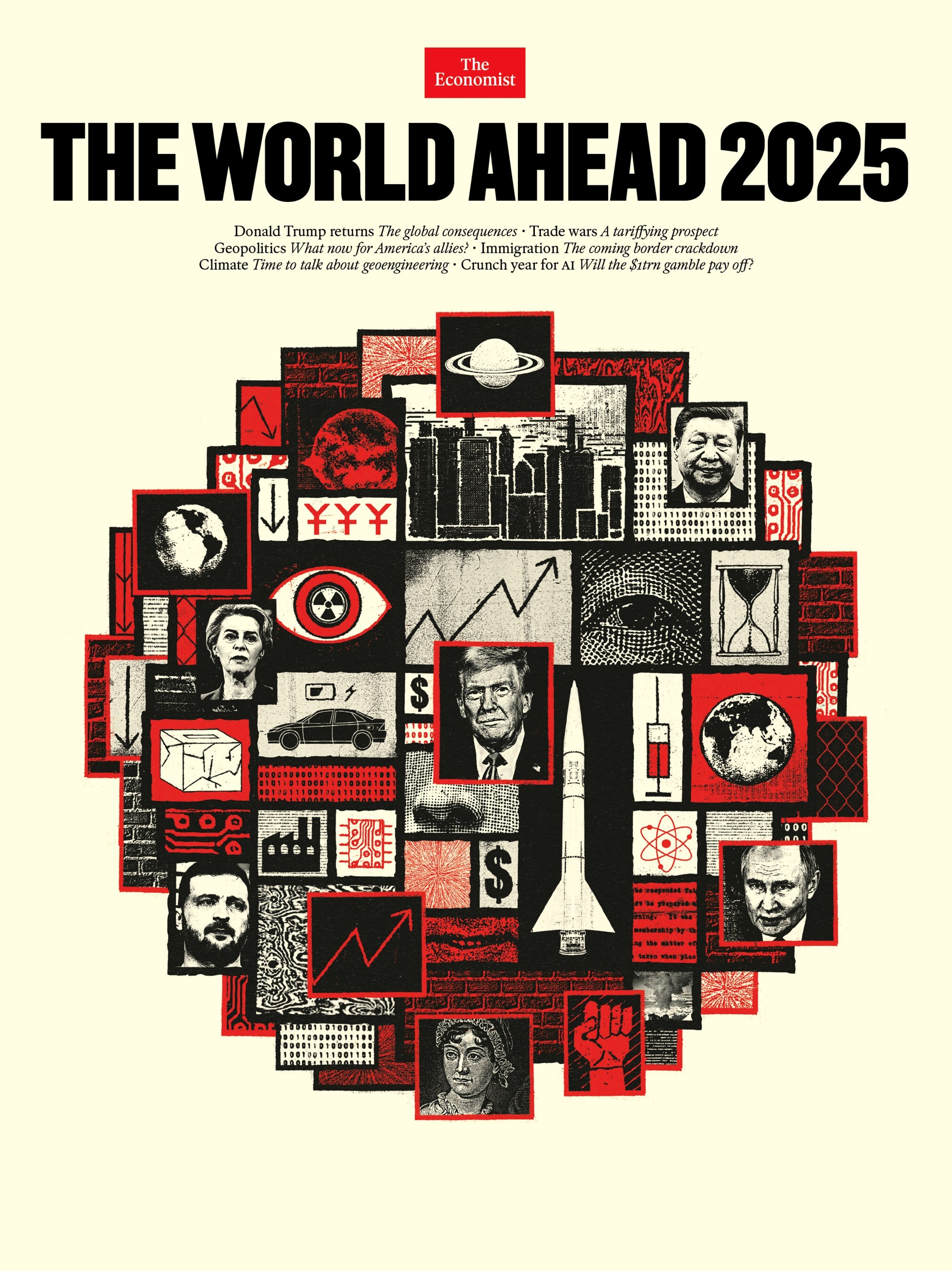The Economist's World Ahead 2025 launches this week, featuring future-gazing content from The Economist's editorial team and global contributors
LONDON, Nov. 19, 2024 -- The Economist has launched The World Ahead, an annual special year-end issue from The Economist that examines important themes, trends and events that will shape the coming year. The editor's top ten themes for 2025 and the accompanying articles are online today on http://economist.com/worldahead2025. The full edition will be available digitally from November 21st, and included in The Economist's weekly print edition dated November 23rd. The standalone print issue will be available on global newsstands from November 29th in the UK and Asia, from December 2nd in Europe and from December 11th in the United States.
Commenting on this year's edition of The World Ahead, its editor Tom Standage said, "Donald Trump's decisive victory and imminent return to the White House will, more than anything else, shape the coming year, with implications in many areas of policy, not just for America, but for the world. What will this mean for global security, the clean-energy transition, international trade and governments' efforts to cut deficits? In a year that promises an unusual degree of change and uncertainty, The World Ahead helps you see around the corner and work out what might be coming next."
In its 39th year, The World Ahead edition discusses a broad range of topics, but its top ten themes for 2025, distilled from its pages, are as follows:
1. America's choice. The repercussions of Mr Trump's sweeping victory will affect everything from immigration and defence to economics and trade. His "America First" policy will have friends and foes alike questioning the solidity of America's alliances. This could lead to geopolitical realignments, heightened tensions and even nuclear proliferation.
2. Voters expect change. More generally, incumbent parties did badly in 2024's unprecedented wave of elections. Some were chucked out (as in America and Britain); others were forced into coalition (as in India and South Africa); others were pushed into cohabitation (as in Taiwan and France). So 2025 will be a year of expectations. Can new leaders deliver what they promised? Will humbled leaders change? If not, unrest may follow.
3. Broader disorder. Mr Trump may push Ukraine to do a deal with Russia and give Israel a free hand in its conflicts in Gaza and Lebanon. America's more transactional stance and scepticism of foreign entanglements will encourage troublemaking by China, Russia, Iran and North Korea (the "quartet of chaos") and more meddling by regional powers, like that seen in crisis-hit Sudan. But it is unclear whether America would stand up to China in a conflict over Taiwan or in the South China Sea.
4. Tariffying prospects. For now, America's rivalry with China will manifest itself as a trade war, as Mr Trump imposes restrictions and ramps up tariffs—including on America's allies. As protectionism intensifies, Chinese firms are expanding abroad, both to get around trade barriers and to tap new markets in the global south. So much for decoupling; Chinese firms, building factories from Mexico to Hungary, have other plans.
5. Clean-tech boom. China's government has encouraged booming exports of solar panels, batteries and electric vehicles to offset a weak domestic economy. The result is a Chinese-led cleantech boom, with adoption of solar panels and grid storage outstripping forecasts. And the world will soon learn whether global emissions have peaked.
6. After inflation. The rich world's central bankers have celebrated the defeat of inflation. Now Western economies face a new challenge: reducing deficits, by increasing taxes, cutting spending or boosting growth. Many may also have to increase defence budgets. Painful economic choices loom. In America, Mr Trump's policies will make things worse: hefty import tariffs could hamper growth and reignite inflation.
7. Age-old questions. America has just picked its oldest-ever president-elect. World leaders are greying, along with their populations. Expect more discussion of age limits for political leaders. China, meanwhile, is looking for economic opportunities in an ageing world. In parts of the Middle East, by contrast, a booming youth population, coupled with a shortage of jobs, risks instability.
8. Crunch time for AI. It's the biggest gamble in business history: more than $1trn is being spent on data centres for artificial intelligence (AI), even though companies are still not sure how to use it and adoption rates are low (though many workers may simply be using it in secret). Will investors lose their nerve, or will AI prove its worth, as "agentic" systems become more capable and AI-developed drugs emerge?
9. Travel troubles. The global movement of people, not just goods, faces increasing friction. Conflict is disrupting global aviation. Europe is adding new border checks, and its borderless Schengen system is fraying. The backlash against "overtourism" will diminish in 2025, but restrictions introduced by many cities, from Amsterdam to Venice, will remain.
10. Life of surprises. With assassination attempts, exploding walkie-talkies and giant rockets being captured by chopsticks, one lesson of 2024 was to expect the unbelievable. What implausible-sounding things could happen in 2025? Our "Wild cards" section offers a selection to watch out for, including a devastating solar storm, the discovery of lost ancient texts—and even another global pandemic.
This year's edition will also feature predictions from the "superforecasting" team at Good Judgment and an interactive graphic on global gerontocracy.
The Economist's journalists are joined in The World Ahead 2025 by leaders from politics, business and science, who add their ideas and predictions for 2025 in "By Invitation" guest articles: Edgars Rinkevics, president of Latvia; Javier Milei, president of Argentina; Sarah C. Paine, professor, US Naval War College; Comfort Ero, president, International Crisis Group; Fei-Fei Li, professor, Stanford University, and "godmother of AI"; Casey Handmer, CEO, Terraform Industries; and Tristram Hunt, director, V&A Museum.
About The Economist (economist.com)
With rigorous reporting, in-depth analysis and global perspective, The Economist explains today's most important events and discerns the trends that will shape tomorrow. In addition to the weekly print edition, The Economist publishes its journalism daily through its website, app, podcasts, 15 newsletters, short- and long-form video and Espresso, an app with concise stories on global news. The Economist has 1.2 million subscribers. More than 60m people follow The Economist across X (formerly Twitter), Facebook, Instagram, YouTube, LinkedIn, TikTok and Threads.
This News is brought to you by Qube Mark, your trusted source for the latest updates and insights in marketing technology. Stay tuned for more groundbreaking innovations in the world of technology.









